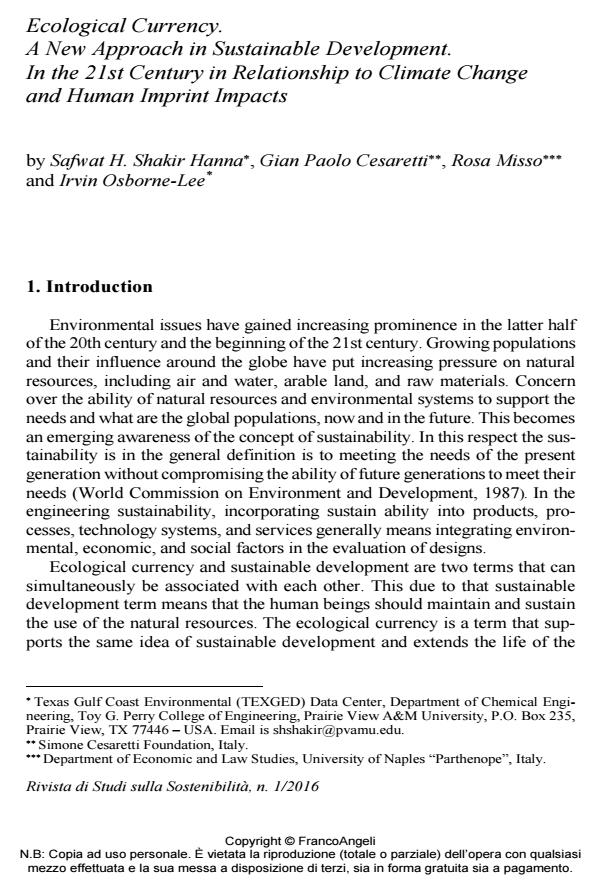Ecological Currency. A New Approach in Sustainable Development. In the 21st Century in Relationship to Climate Change and Human Imprint Impacts
Titolo Rivista RIVISTA DI STUDI SULLA SOSTENIBILITA'
Autori/Curatori Hanna Safwat H. Shakir, Gian Paolo Cesaretti, Rosa Misso, Irvin Osborne-Lee
Anno di pubblicazione 2016 Fascicolo 2016/1
Lingua Italiano Numero pagine 12 P. 13-24 Dimensione file 164 KB
DOI 10.3280/RISS2016-001003
Il DOI è il codice a barre della proprietà intellettuale: per saperne di più
clicca qui
Qui sotto puoi vedere in anteprima la prima pagina di questo articolo.
Se questo articolo ti interessa, lo puoi acquistare (e scaricare in formato pdf) seguendo le facili indicazioni per acquistare il download credit. Acquista Download Credits per scaricare questo Articolo in formato PDF

FrancoAngeli è membro della Publishers International Linking Association, Inc (PILA), associazione indipendente e non profit per facilitare (attraverso i servizi tecnologici implementati da CrossRef.org) l’accesso degli studiosi ai contenuti digitali nelle pubblicazioni professionali e scientifiche.
This article focuses on the importance of the carbon currency as a fundamental tool to support sustainability. Starting from a theoretical approach and underlining the significance of an ecological currency in regenerating the resources and conserve the existing natural resources in the paper it has been proposed the use of a carbon currency. This last is crucial because it is important a type of currency that will be a measure to discuss the climate change impacts. More precisely, the impacts of human imprints and climate changes are important to be discussed and to be connected to the carbon currency which can measure quantitatively the release of carbon dioxide and other warming gases that are harming the environment and cause problems to the natural resources which allow to produce goods and services that we are using daily in our life.
Parole chiave:Valuta ecologica sviluppo sostenibile economia sostenibile, valuta carbonio, cambiamenti climatici.
Hanna Safwat H. Shakir, Gian Paolo Cesaretti, Rosa Misso, Irvin Osborne-Lee, Ecological Currency. A New Approach in Sustainable Development. In the 21st Century in Relationship to Climate Change and Human Imprint Impacts in "RIVISTA DI STUDI SULLA SOSTENIBILITA'" 1/2016, pp 13-24, DOI: 10.3280/RISS2016-001003